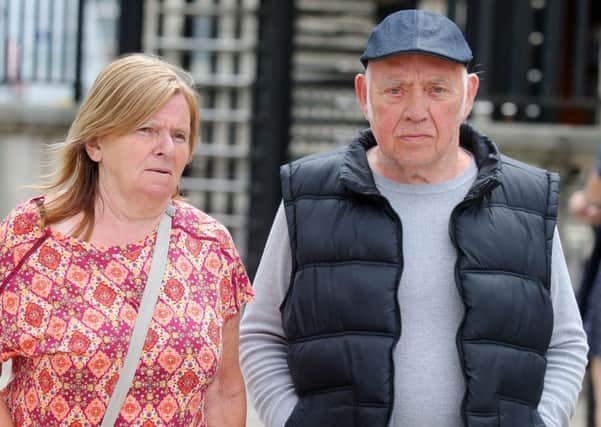Parents of shot IRA man in bid to overturn inquest verdict


Teresa and Hugh Jordan claim the coroner was unjustified in finding it impossible to determine with certainty what happened when their son Pearse was killed by an RUC sergeant 25 years ago.
Their lawyers argued that a failure to decide on central issues surrounding the lawfulness of the shooting in west Belfast amounted to an abdication of responsibility.
Advertisement
Hide AdAdvertisement
Hide AdJudgment was reserved yesterday in the couple’s application for leave to seek a judicial review.
Pearse Jordan’s death was one of several high-profile cases in Northern Ireland involving allegations that the RUC were involved in shoot-to-kill incidents.
The 22-year-old had been driving a hijacked car stopped by police in an anti-terrorist operation in November 1992.
He was shot after getting out on the Falls Road and trying to run away, unarmed.
Advertisement
Hide AdAdvertisement
Hide AdIn November last year the coroner overseeing a fresh inquest into the death said he was not convinced either by family claims that their son was gunned down in cold blood, or by police assertions that the sergeant acted in self-defence.
He held that the State had failed to prove the use of lethal force was lawful, but concluded that the precise circumstances of how the IRA man met his death remain unknown.
Challenging that verdict, counsel for Mr and Mrs Jordan argued that the disputed issues of fact should have been resolved in the evidence.
They are seeking a declaration that the inquest was unfair, unlawful and in breach of the European Convention on Human Rights.
Advertisement
Hide AdAdvertisement
Hide AdIt was claimed that the coroner disregarded ballistic evidence without evaluation or explanation, and failed to apply the identified standard of proof to issues in the case.
Barry Macdonald QC, for the Jordans, insisted it had not been among a category of inquests were a lack of evidence undermines attempts to establish what happened.
He told the court: “This is a case where all the material witnesses had made statements at the time and didn’t rely on any loss of memory.
“The kind of factors that might in other cases have justified a (verdict) that it was impossible to reach a conclusion just didn’t operate in the present case.”
Advertisement
Hide AdAdvertisement
Hide AdBut Sean Doran QC, for the coroner, countered that all grounds of challenge could be defeated by a close examination of the judgment reached.
He stressed how the coroner had listened to 16 days of evidence, closing submissions and immersed himself in volumes of material generated by the hearing.
Those documents included witness statements, maps, photographs, police reports and transmissions, forensic and pathology dossiers, along with transcripts from previous inquests into the shooting.
“The coroner was best placed to reach conclusions about the facts, and make assessments about the credibility of witnesses,” Mr Doran added.
Advertisement
Hide AdAdvertisement
Hide Ad“A court of review must be very wary in treading on the coroner’s fact-finding domain.”
Tony McGleenan QC, representing the chief constable, agreed with his assessment that an arguable case had not been established.
He argued: “The grounds of challenge are not tenable.”